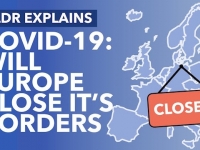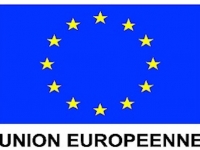Politics
EUROPEAN COUNCIL UNVEILS A SET OF SAFE COLLECTIVE CROSS BORDER TRAVEL CONCLUSION
OVER COVID-19 TO RETSORE CONFIDENCE

European Council Logo (Source: European Union)
USPA NEWS -
As part of the EU's response to the COVID-19 pandemic, the Council today adopted a set of conclusions aimed at restoring passengers´ and workers' confidence by minimising the risk of infection in cross-border collective passenger transport systems. In the conclusions, the Council promotes a number of basic hygiene and infection control measures, which should apply to all cross-border collective passenger transport services. Such recommended measures consist of among others :
“¢ physical distancing or, where this is not feasible, use of masks,
“¢ greater use of digital ticketing and digital ticket inspections,
“¢ observing high standards of fresh air circulation and cleanliness of means of transport.
The Council also invites the Commission and member states to continue coordinating on the application of the transport guidelines and recommendations on Covid-19 adopted at national and EU level.
“¢ physical distancing or, where this is not feasible, use of masks,
“¢ greater use of digital ticketing and digital ticket inspections,
“¢ observing high standards of fresh air circulation and cleanliness of means of transport.
The Council also invites the Commission and member states to continue coordinating on the application of the transport guidelines and recommendations on Covid-19 adopted at national and EU level.
THE COUNCIL OF THE EUROPEAN UNION HAVING REGARD TO--------------------------------------------------------------
- the European Commission´s Guidelines on the progressive restoration of transport services and connectivity of 13 May 20201 “¨
- the EU Guidance for the progressive resumption of tourism services and for health protocols in hospitality establishments of 13 May 20202, “¨IS COMMITTED to playing its part in regaining the confidence of the European Union citizens in cross-border collective passenger transport systems, by promoting the use of a coordinated and reliable set of measures that protects public health and the health of staff employed in the cross- border collective passenger transport sector, in order to preserve and strengthen the single market while restoring full connectivity; “¨NOTES that the COVID-19 pandemic and related restrictions have for the time being changed people´s mobility patterns and led to a significant drop in the number of passengers across all modes of collective passenger transport; “¨WELCOMES that, as the lockdown and travel restrictions are gradually being relaxed and temporarily reintroduced controls at internal borders are being lifted, passenger numbers are rising again; “¨
CONFIRMS that cross-border services will only operate smoothly if the measures for all modes of transport are transparent and communicated clearly so that passengers know before the start of their journey whether obligations and recommendations apply at their place of departure and destination and to the means of transport they will be using, and if so, what those obligations and recommendations are; and that this information is updated regularly as to ensure its reliability;
CONSIDERS that all restrictive measures adopted for the protection of health and the prevention of the further COVID-19 infections should be constantly adapted to the epidemiological situation as necessary and should, in principle, not remain in place after the situation has returned to pre- COVID-19 conditions;
CONSIDERS that, as far as possible, all transport sectors should be treated in a consistent manner and AGREES with the statement by the European Commission that, in order to preserve a level playing field, transport operators that provide equivalent services are to be subject to equivalent standards;
NOTES HOWEVER, that it will also continue to be of crucial importance that individual solutions reflecting the specificities of each transport mode be developed and subsequently applied to cross- border services throughout Europe so as to preserve and enhance the attractiveness of the various modes of cross-border collective passenger transport while ensuring that the health of both passengers and staff is protected;
STRESSES the importance that any deviation from this common approach is fully and transparently based on the best available epidemiological evidence at the disposal of the European Centre for Disease Prevention and Control (ECDC);
NOTWITHSTANDING the need to restore passengers´ confidence in safe travel, UNDERLINES that Member States ought to have flexibility in applying the measures promoted hereby, in view of the evolution of the epidemiological situation;
WHEREAS the following measures cannot eliminate infections but can, if they are complied with, minimise the risk of infection;
STRESSES the importance that certain basic hygiene and infection control rules apply to all cross- border collective passenger transport services irrespective of the provisions in place at the place of departure or destination. SUGGESTS that such rules are coordinated and that Member States promote in particular the following measures:
- wherever circumstances permit, all travellers should keep a safe distance from other people, with the exception of members of their family or household with whom they are travelling; Ҭ
- where technically feasible all options for reducing physical contact, for instance making greater use of digital ticketing and digital ticket inspections, should be considered and if possible exploited; Ҭ
- facilitate border crossing procedures to minimise contact between staff and passengers as much as possible within the existing framework; Ҭ
- unless other technical or organisational measures can be taken for maintaining physical distance, it is suggested that, in accordance with national infection control measures, travellers cover their mouth and nose on all means of transport operating cross-border collective passenger services (vehicles, trains, vessels and airplanes, access points and boarding and disembarkation infrastructure); Ҭ
- adequate circulation of fresh air and a regular supply of fresh air should be ensured on all means of transport operating cross-border services and Ҭ
- cleaning should be intensified on all means of transport operating cross-border collective passenger services (vehicles, trains, vessels and airplanes, access points and boarding and disembarkation infrastructure) and, where cleaning has already taken place, a high standard of cleanliness should be maintained; this might include making available disinfectant products; ҬENCOURAGES Member States and responsible entities to continue to conduct information and publicity campaigns in order to strengthen travellers' confidence by raising their awareness of the measures taken to contain the pandemic including discouraging travellers from embarking any means of transport when experiencing symptoms of COVID-19; Ҭ
ENCOURAGES transport operators providing cross-border services and travel agents, in particular, to make available on their websites and their application software for mobile devices ('apps') and at frequent intervals on the access routes and on the means of transport, all the information in their possession on hygiene rules and recommended behaviour in public spaces and on the means of transport, whenever possible;
SUGGESTS that the aviation transport sector follows the guidelines and recommendations of the European Union Aviation Safety Agency (EASA), the ECDC and the International Civil Aviation Organization (ICAO), which have been published in response to the COVID-19 pandemic;
SUGGESTS that the maritime transport sector follows the guidelines and recommendations of the European Maritime Safety Agency (EMSA) and the ECDC;
SUGGESTS that the rail transport sector, follows the guidelines and recommendations of the European Union Agency for Railways (ERA) and the ECDC;
WELCOMES the guidelines developed by the European River Cruise Association (IGRC) and the European Barge Union (EBU) on ramping up inland waterway transport and river cruising;
TAKES NOTE OF the guidelines and recommendations developed by the International Road Transport Union (IRU) for cross-border bus and coach services;
INVITES the European Commission to continue the coordination of the application of the transport guidelines and recommendations adopted at national and EU level on Covid-19, e.g. through the network of national contact points;
ENCOURAGES the Member States to coordinate among themselves the actions taken and to make an active contribution to a regular exchange of views on best practices;
STRESSES that the creation and maintenance of the “˜Re-open_EU´ website by the European Commission is of key importance, ENCOURAGES all Member States to report to the European Commission all the rules, procedures and recommendations currently applicable in their jurisdiction and to always keep this information up to date and NOTES, in this context, the development of an EU-wide contact tracing and warning system;
ENCOURAGES the implementation of the above principles by Member States, at national, regional and local level, and INVITES other stakeholders to implement them in their respective fields;
ENCOURAGES Member States to consider an appropriate application of the suggested measures in these conclusions also to domestic collective passenger services. Source: European Council
European Council President Emmanuel Macron Chancelor Angela Merkel Mark Rutte Pm Charles Michel Ursula Von Der Lyen Commission Parliament The Netherlands Recovery Plan Covid-19 Rahma Sophia Rachdi Jedi Foster
Liability for this article lies with the author, who also holds the copyright. Editorial content from USPA may be quoted on other websites as long as the quote comprises no more than 5% of the entire text, is marked as such and the source is named (via hyperlink).







